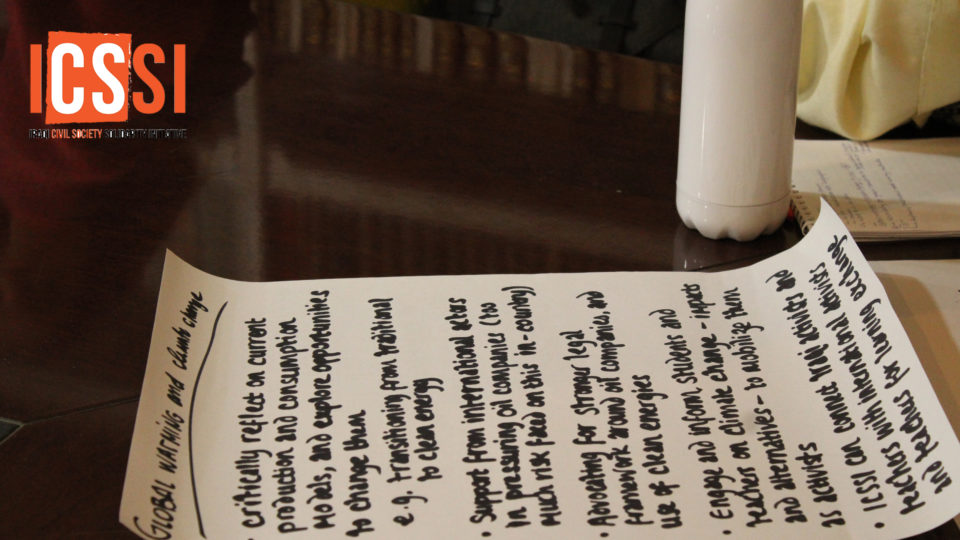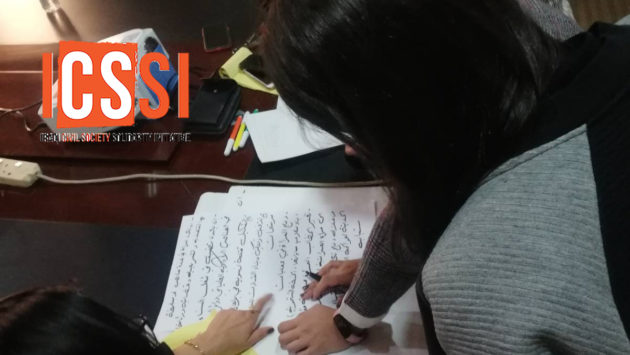ICSSI CONSENSUS CHARTER
Participatory Democracy Principle in Practice
INTRODUCTION
The ICSSI promotes, both in its internal and external relations, the establishment of participatory decision-making processes by applying the Consensus Methodology.
Participatory processes allow to take collective decisions as they are based on the capacity to include diversities and, thus, by our cultural models and by the group’s dynamics, which are often mutually interrelated.
The Consensus is a methodology which aims at shaping the group’s dynamics towards collective
participation and common decisions.
Some definitions of the consensus methodology are:
“Decision-making process within a community which foresee the achievement of a shared decision by all the participants though dialogue and mediation. The consent method is thus distinguished from the methods based on the majority principle and from those based on the principle of authority” – Treccani
“A group decision-making process which aims at reaching out a consensual decision, namely,
that won’t be only expression of the majority but including also the minority’s opinion” –
Wikipedia Group
“Decision-making process that seek to solve conflicts in a pacific manner, and to develop decisions that everyone can support through collaboration” – International Institute for Facilitation and Change
“The consensus methodology refers to formal procedures that different groups and organizations establish in different forms depending on their background of techniques and knowledge, in a continuous evolution.
These procedures always imply the nonviolent conflict management aiming at facilitating the emerging, the recognition and the valorisation of different perspectives with the objective of achieving agreements on decisions that can be respected and that can, effectively, be sustained by everyone without recurring to the vote.”- Roberto Tecchio
At the core of the Consent there is the collective responsibility assumed towards the decision- making. Indeed, consent shall not to be confused with the idea of an absolute agreement: on the contrary, is the capacity to find agreement in disagreement.
Accordingly, when inside group different opinions arise, the responsibility in consensus requires each participant to approach the disagreement not by focusing on his/her own opinion’s truths, trying to convince the other and thus keeping the disagreement as condition. It requires, instead, to start by thinking in the dimension of the group, acknowledging at first the reality of the fact that “as a group, we have different and/or in conflict perspectives”, for then focus on building the agreement relying on the capacity of each participant to actively listen to the other.
Groupthink: The problem of Negative Consent
Groupthink is an underlying and typical group dynamic for which groups tend easily to adapt to
the majority (or strong minority)’s opinion.
Generically it happens when who thinks differently avoids bringing his/her diversity into the discussion.
For this reason, it is not unusual to have situations of unperceived negative consent: it seems that there is agreement towards a decision but, in reality, it is because people in disagreement are avoiding expressing themselves.
Positive Consent: The Worth of Diversity
When consent is applied positively, it means that in the group different perspectives are always heard and become integrated as part of the decision. This requires considering not only the contents (the objective of agreement and disagreement), but also the relationship dimension.
Indeed, as based on the personal and collective capacity to include differences, participatory decision-making processes rely largely on the level of trust built between the team members.
To enhance trust and understanding within the team, the consensus methodology makes use of
basic agreements, clear roles, and common processes.
ICSSI BASIC AGREEMENTS IN DECISION-MAKING
1 – Everyone is committed to participate and to listen to the others’ perspectives actively and
humbly.
- Everyone should feel welcome and try to make the other feel safe in the space of the discussion.
- Everyone commits to not interrupt and pay attention to the others’ willingness to talk; if you
find yourself dominating the discussion, step back.
- – Everyone respect the others’ time by not taking the floor for too long: self-regulation is required, especially when the time for interventions is not established.
- – Everyone is not going to intervene two times on the same issue until the others who desire to speak have had their turn.
Encouraged positive attitudes towards the discussion:
- – If you find yourself in the discomfort of disagreement, try to transform it into a learning opportunity by making constructive questions.
- – Use “I” statements to express your opinion, and avoid generalizing, recognizing instead the specificity of the others and the possibility that they think differently.
- – Critique ideas and behaviours, not individuals: retain from judgement and personal attacks.
- Be tolerant and patient with the other’s unfamiliarity with the issues.
- Always try not to think in a binary way (either/or), avoid simplification and try to find mediations in complexity.
11 – Participate focusing on the common aim instead of partial objectives.
12- Establish your willingness to share power and encourage the expression of the other’s
power.
13 – Do not avoid but find a way to tackle conflicts through nonviolent communication.
BASIC ICSSI PROCEDURES TO BE IMPLEMENTED:
- A facilitator must be always identified for the meetings and must be capable of well- managing the facilitation. He or she has the primary responsibility to ensure the effectiveness and inclusiveness of the decision making.
- Every meeting shall have a clear agenda. Participants are called to respect it or propose amendments.
- Meeting’s timing shall be limited and clear, and people informed ahead in order to
allowing to organize themselves.
- Members of the meetings must be provided of all necessary information and documents to prepare and analyse in advance the decision to be taken.
- Members of the meetings shall be aware of the consensus methods.
- When a discussion gets off track, it can be given a break to return on it later, giving time for people to reflect.





